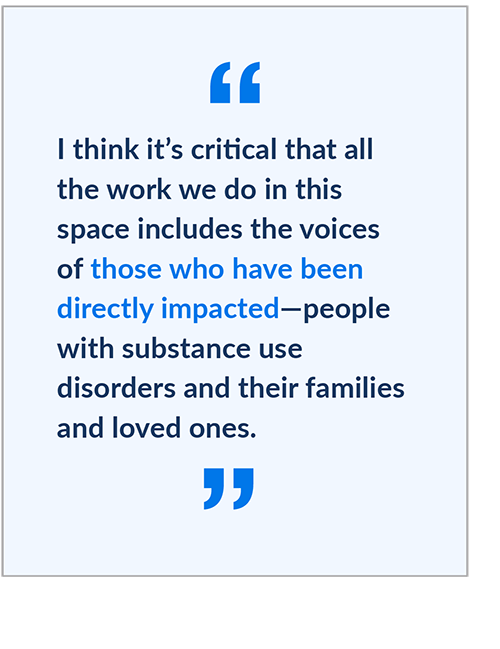Meet the Expert: Dr. Elizabeth Salisbury-Afshar
 As an expert on substance use disorders, Elizabeth Salisbury-Afshar, M.D., directs the Center for Addiction Research and Effective Solutions at AIR (AIR CARES). She is board certified in family medicine, preventive medicine/public heath, and addiction medicine and holds a Master of Public Health degree. Prior to joining AIR, she served as the Medical Director of Behavioral Health at the Chicago Department of Public Health where she developed and led the Department's strategy to address the opioid overdose epidemic. This included expanding access to evidence-based treatment and harm reduction services. Dr. Salisbury-Afshar still practices part-time at Heartland Alliance Health, a health care provider for the homeless in Chicago.
As an expert on substance use disorders, Elizabeth Salisbury-Afshar, M.D., directs the Center for Addiction Research and Effective Solutions at AIR (AIR CARES). She is board certified in family medicine, preventive medicine/public heath, and addiction medicine and holds a Master of Public Health degree. Prior to joining AIR, she served as the Medical Director of Behavioral Health at the Chicago Department of Public Health where she developed and led the Department's strategy to address the opioid overdose epidemic. This included expanding access to evidence-based treatment and harm reduction services. Dr. Salisbury-Afshar still practices part-time at Heartland Alliance Health, a health care provider for the homeless in Chicago.
POSITION: Director
AREAS OF EXPERTISE: Public Health, Substance Use Disorders, Behavioral Health-Primary Care Integration
YEARS OF EXPERIENCE: 12
Q: What inspired you to go into medicine and how did you come to specialize in public health?
Elizabeth: I'm from a rural farming community and growing up I wasn't exposed to a lot of different careers. I excelled in science and was drawn to service careers, so medicine seemed like an obvious path. But as I started medical school, I became involved in a lot of outreach work—in homeless shelters and working with immigrant and refugee populations—and quickly realized that many of the factors impacting people’s health were not things that could be addressed with a prescription pad in a doctor’s office.
The term “social determinants of health” wasn’t mainstream at the time, but I was very interested in the way various factors impacted health and contributed to disparities in health outcomes. I spent a summer in Guatemala, working at an HIV hospice and orphanage, and then took a year off from medical school to work on the rollout of an HIV project in Illinois that worked to eliminate maternal-fetal HIV transmission. All of these experiences led me to understand the critical role of public health and to have a broader understanding of all the ways health is impacted—which goes beyond the delivery of individual health care.
Q: You now focus on addiction issues. What’s the biggest challenge facing doctors and medical practitioners with regard to the opioid epidemic?
Elizabeth: Most physicians and health care providers have received little, if any, education about substance use disorders. Although we have treatments that are highly effective in treating opioid use disorder, not many providers are familiar with them and even fewer actually prescribe these treatments.
Additionally, the stigma against people who have substance use disorders often makes medical providers feel hesitant to offer treatment services in their offices. Even when providers obtain additional training and overcome the stigma against working with people who use drugs, a lack of financial incentive serves as an additional barrier to delivering these services. There are so few insurance reimbursement mechanisms for hospitals and providers and the ones that exist pay at a very low rate. I'm hopeful that through increased training opportunities, stigma reduction, and reimbursement reforms we'll see treatment gaps start to close.
Q: Are any cities or countries implementing innovative drug policies with positive results?
Elizabeth: Portugal has some of the most progressive drug policies in the world—they've decriminalized drug use and drug possession for small volumes of drugs. They’ve had amazing outcomes in reducing the number of people using drugs, as well as the reducing the negative health consequences related to drug use (HIV, hepatitis C, overdoses, and deaths).
I recently visited overdose prevention sites in Toronto, Canada. These are places where people can use drugs without fear of arrest. They provide clean supplies and employ people trained to respond to overdoses. It was a wonderful experience to meet the staff and participants and learn about their experiences. There are some great lessons to be learned from other countries’ approaches to substance use.
 Q: What’s your go-to professional resource?
Q: What’s your go-to professional resource?
Elizabeth: I don’t think I have just one! I get a variety of weekly alerts from the Journal of the American Medical Association, Journal of Addiction Medicine, American Journal of Preventive Medicine, and American Journal of Public Health.
Q: What would you say to someone currently considering a career in behavioral science research and consulting?
Elizabeth: With increasing rates of drug overdose and suicide in the U.S., we have a great need for more research, training, and technical assistance with regard to evidence-based practices. I think it’s critical that all the work we do in this space includes the voices of those who have been directly impacted—people with substance use disorders and their families and loved ones. I’d recommend that anyone interested in the field who hasn’t been personally impacted find ways to work with and talk to people who have.
Q: If you hadn’t gone into medicine and research, what would you have done instead?
Elizabeth: I would have studied sociology or public health. And even then, I think I still would have found my way to a role in research, training, and/or technical assistance!
Q: What was the last great book you read?
Elizabeth: Chasing the Scream: The First and Last Days of the War on Drugs by Johann Hari. It’s about the history of the “war on drugs” and provides policy suggestions for different approaches.
Q: Where can we find you on a typical Saturday afternoon?
Elizabeth: With my family. We’re usually at the park, swim lessons, or another outdoor activity (weather permitting in Chicago!). My husband and I have a 3-year-old and a 6-year-old, and they keep us on our toes!
Elizabeth Salisbury-Afshar is no longer with AIR, as of August 2020.